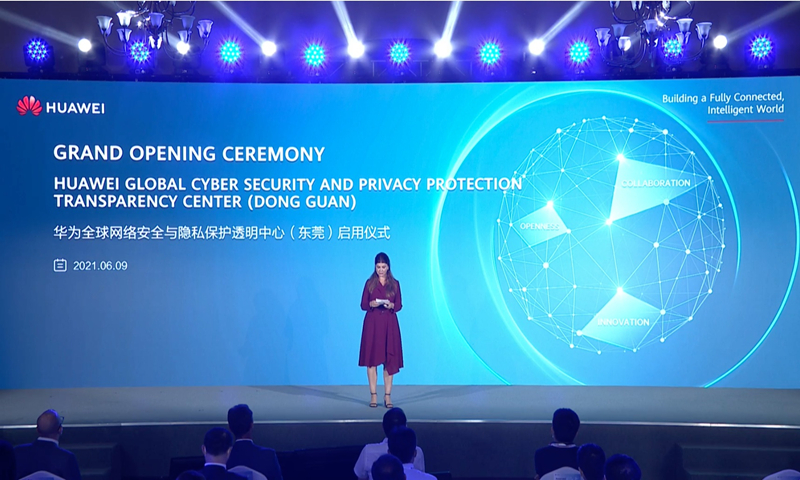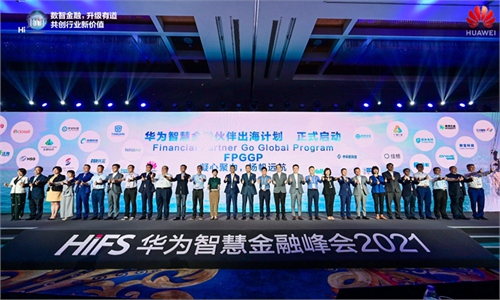
The opening ceremony of Huawei's largest Global Cybersecurity Transparency Center in Dongguan, South China's Guangdong Province on Wednesday Photo: screenshot of live event
Huawei launched its largest Global Cybersecurity and Privacy Protection Transparency Center in Dongguan, South China's Guangdong Province on Wednesday.
Analysts said that the center can help fend off some malicious slander, especially from the US government that has used security as an excuse to crack down on Huawei.
Huawei is not opening a transparency center to please people, but to continue to support its customers, said John Suffolk, global cybersecurity and privacy officer of Huawei on Wednesday.
The Dongguan center will be open to regulators, independent third-party testing organizations, standards organizations, and Huawei's customers, partners and suppliers.
The company has set up six cybersecurity and transparency centers over the past decade in Europe, the Middle East, and North America.
These centers are designed to address the issues that have emerged from a cyberspace that is more complex than ever, as industry digitalization and new technologies such as 5G and artificial intelligence (AI) have developed fast speed in recent years.
The fact that the COVID-19 pandemic made people spend more time on online activities also increased the risks in cybersecurity, said Ken Hu, Huawei's rotating chairman, at the opening ceremony.
"Huawei's decision to open such a cybersecurity transparency center aims to dispel the security concerns of some Western countries. Of course, for countries that want to and are used to monitoring other countries' intelligence, the Dongguan center may indeed be a concern, as they cannot easily steal intelligence as before," Ma Jihua, an industry analyst who closely follows Huawei, told the Global Times on Wednesday.
When asked about fears connected to cybersecurity and the US ban on Huawei, Suffolk said that the market reality is that Huawei has limited access to certain components and that it has repositioned in some markets.
"I genuinely believe that if all countries and customers had a free choice in buying products, some of them would buy Huawei products, when they have said that they would not buy," Suffolk noted, adding that it is the view of Huawei's customers that matters, not the view of an individual government.
Huawei also, for the first time, made its product security baseline framework and management practices available to the industry by releasing a Product Cyber Security Baseline on Wednesday.
Huawei officials said that cybersecurity risk is a shared responsibility and called for international efforts to develop a unified understanding of cybersecurity challenges.
"We want to invite all stakeholders, including customers, regulators, standards organizations, technology providers, and testing organizations, to join us in discussing and working on cybersecurity baselines. Together, we can continuously improve product security across the industry," said Sean Yang, director of Huawei's global cybersecurity and privacy protection office, during the opening ceremony.
The industry still lacks a standards-based, coordinated approach, especially when it comes to governance, technical capabilities, certification and collaboration, Hu said.
Huawei has built more than 1,500 networks that connect more than 3 billion people across 170 countries and regions during the past 30 years. None of these networks have ever experienced a major security incident.



